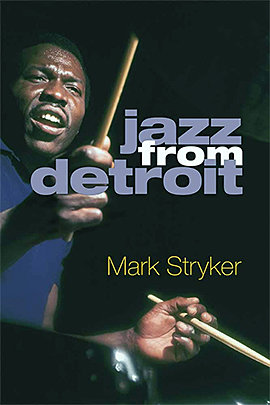Book Review
Mark Stryker, Jazz from Detroit (Ann Arbor: University of Michigan Press, 2019) 342 pp.
Mark Stryker’s book has finally arrived! The front has a great shot of Elvin Jones, and the back has endorsements from Sonny Rollins and Herb Boyd.
A former Arts reporter for the Detroit Free Press, Stryker crafted quality music and art pieces. He continued the standard set by W. Kim Heron during Heron’s tenure as jazz writer at the Freep.
 Stryker, a saxophonist, moved to Detroit in 1995 and was quickly absorbed into the music scene as an arts reporter. He covered the Detroit Jazz Festival and interviewed Detroiters when they came home. Stryker expanded those interviews and added in many others as well as bringing to outsiders many less-known Detroit components, like record labels and Tribe magazine. He put 20+ years of research into Jazz from Detroit, and it shows. Stryker is a gifted music writer, one of the best I’ve enjoyed in fifty years of reading books about jazz.
Stryker, a saxophonist, moved to Detroit in 1995 and was quickly absorbed into the music scene as an arts reporter. He covered the Detroit Jazz Festival and interviewed Detroiters when they came home. Stryker expanded those interviews and added in many others as well as bringing to outsiders many less-known Detroit components, like record labels and Tribe magazine. He put 20+ years of research into Jazz from Detroit, and it shows. Stryker is a gifted music writer, one of the best I’ve enjoyed in fifty years of reading books about jazz.
He paints nuanced portraits of Detroit’s more significant jazzers, like Burrell, Lateef, James Carter, Gerald Wilson and many more. Stryker dug deep into their recordings and he discusses the Gold Standard records of each musician. He also finds and connects the dots between musicians, sometimes spanning decades. He sets up the content by stressing importance of the public schools and the early history of jazz in the city. For example, he shows us the pianist Willie Anderson, who was pursued by Benny Goodman and Dizzy Gillespie but remained in Detroit. And he explores the bond between Detroit’s musicians and the fans who help nurture them. Detroit’s jazz community has always been strong and active.
Stryker does a fine job of unfolding uniquely Detroit developments like Strata Records, Tribe magazine / records, and Marcus Belgrave. His section on Belgrave is beautifully written and presents Marcus’ leadership and gifts as an educator, his determination to keep the music expanding during Detroit’s barren years, and the many younger players he guided. He’s done a fine job of telling us the who/what/when and why of the many cultural programs fostered or supported by Harrison, Belgrave, Brooks, Harold McKinney, and others. There are many fascinating stories, like Roland Hanna and Coleman Hawkins exploring classical recordings, and Miles Davis’ comparing Freddie Hubbard and Thad Jones.
Stryker mentions Detroit’s public radio station, WDET-FM and could have amplified it to show the link between Detroit’s jazz community and WDET. Drummer Bud Spangler started Jazz Today in 1968. Over the next fifteen years Mett-Ezzthetics (hosted by Faruq Z. Bey), Everywhere Music Goes (Nkenge Zola), Kalidophone (Kenn Cox, later Geoffrey Jacques), Sound Projections (Kofi Natambu), and several other jazz-centric programs debuted. There were easily a dozen radio programs focused on different Detroit populations as well. WDET-FM remained a Detroit focused radio station into the 1990s.
Detroit now has three fine tomes documenting and discussing Detroit jazz and the community that supports it. The earlier ones are Herb Boyd, Black Detroit (New York: HarperCollins,2017) and Lars Bjorn with Jim Gallert, Before Motown: A History of Jazz in Detroit, 1920 – 1960 (Ann Arbor: University of Michigan Press, 2001).
Mark Stryker has written a fine book about Detroit jazz that will take its place on bookshelves everywhere. Highly recommended!